
Dr.
Jayanth Kumar
Male
Affiliation
Additional Professor
Department of
Biochemistry
Contact
Email :
jayanth.aiims@gmail.com
EDUCATION
MBBS, Medicine and Surgery (2000-2006)
Government Stanley Medical College,
Chennai, Tamilnadu
MD, Biochemistry, (2007-2010)
All India Institute of Medical Sciences (AIIMS), New Delhi.
PROFESSIONAL EXPERIENCE
Senior Demonstrator (2010-2012)
Department of Biochemistry, AIIMS, New Delhi
Postdoctoral Research Fellowship (2012-2014)
Department of Pathology and Lab Medicine
David Geffen School of Medicine at UCLA, Los Angeles, California
Assistant Professor (2014-2017)
Department of Biochemistry, AIIMS, New Delhi
Associate Professor (2017-2020)
Department of Biochemistry, AIIMS, New Delhi
Additional Professor (2020-Present)
Department of Biochemistry, AIIMS, New Delhi
Our Team
- Scientists and Postdoctoral Fellows
- Dr Kriti Kaushik: Postdoctoral Research Fellow (DHR Young Scientist-III). Kriti joined the lab as a DBT-Research Associate (fellowship) in 2018 with an interest to decipher the role of long non-coding RNAs in regulating IGF2BP3 in aggressive cancers. She has expanded her research investigation as a DHR Young Scientist to study another class of non-coding RNAs i.e. circular RNAs bound with IGF2BP3 and their mechanism of action in promoting metastasis during hypoxia in leukemia patients. With a strong background in genomics (during her PhD from CSIR-IGIB), Kriti also works on bioinformatic analysis of RNA-seq and related data.
- Dr Sumedha Saluja: Sumedha is an ICMR project scientist-I. She joined the lab in March 2018 and did her PhD in the lab. She is currently investigating the role of epitranscriptome and IGF2BP family of RNA-Binding Proteins in B-cell Acute Lymphoblastic Leukemia. She has a Masters in Biochemistry from AIIMS with a thesis focussed on stem cells and cancer. During her MSc, she was awarded with UGC Postgraduate Merit Scholarship for University Rank Holder and she was a University Gold Medalist in Biomedical Sciences.
- Dr Sivapar Mathan: Mathan is an ICMR project scientist-II. He is working on using CRISPR screens to rapidly identify therapeutic vulnerabilities in B-ALL.
- Tejaswini Choudhury: Tejaswini is an ICMR project scientist-I. She is working on the role of various immune cell subsets in liver transplant rejection and on creating synthetic circuits to identify intracellular signals.
- Graduate Students
- Ishu Bansal: Ishu is a fourth year PhD student and ICMR-SRF. She joined the lab in May 2021. She is investigating the role of IGF2BP family of RNA-Binding Proteins in modulating the PI3K pathway in B-cell Acute Lymphoblastic Leukemia.
- Mohammad Sabique Beg: Sabique is a fourth year PhD student and DBT-SRF. He joined the lab in May 2021. He is working on using CRISPR directed therapies to silence IGF2BP3 in cancer cell lines.
- Ruchi Bhardwaj: Is a second year PhD student and a DBT-JRF. She joined the lab as a graduate student in March 2023. She works on identifying gene networks perturbed by m6A modifications in B-ALL.
- Tanu Bansal: Is a second year PhD student and a DBT-JRF. She joined the lab as a graduate student in March 2023. She works on designing synthetic circuits to target relapse specific genes in B-ALL.
- Senior Resident: Dr Sharath is a senior resident who joined the lab in Feb 2021. He works on deciphering the synergism between epitranscriptomic modifications and IGF2BPs in the stability of mRNAs. He also works on developing CRISPR directed AAV based therapies for Gaucher’s disease
- Project Associate-I: Anjli Gaur is a DHR project associate and is working on the identifying the role of relapse specific genes in B-ALL.
- Nitesh: Lab technician who helps in patient sample collection, processing and data collation
Alumni:
- Dr. Elza Boby: Elza was a Junior resident in the Biochemistry Department (2015-2018). Elza worked on the ‘Role of IGF2BP1 in ETV6-RUNX1 translocation positive B-ALL’ as part of her dissertation in our lab. She is presently working at Calicut Medical College in the Department of Biochemistry as Assistant Professor.
- Sanjeev Goswami: Sanjeev worked on the ‘Role of IGF2BP3 in the invasion and migration of cancer cells’ during his Masters in Biochemistry (2016-2018) in our lab. He is presently enrolled as a PhD student in Prof Kunzang Chosdol’s lab in Biochemistry at AIIMS, New Delhi.
- Dr Thakur Nidhi: Nidhi was a Junior Resident in the Biochemistry Department (2016-2019) Nidhi worked on the ‘Role of EGFL7 in ETV6-RUNX1 translocation positive B-ALL’ as part of her dissertation. She is presently working as a Senior Resident at ESIC, Faridabad.
- Harsh Bhakhri: Harsh worked on ‘The role of METTL3 and IGF2BP synergism in leukemogenesis’ during his Masters in Biochemistry (2019-2021) in our lab. He is presently enrolled as a PhD student in Prof Kalpana Luthra’s lab in Biochemistry at AIIMS, New Delhi.
- Arjun Saraswat and Lajja Patel: Arjun and Lajja were MBBS students who had been selected by the institute’s UG Mentorship Research Scheme. They worked on the role of IGF2BP3 associated circular RNAs in hypoxia and epithelial to mesenchymal transition.
- Dr Gunjan Sharma: Gunjan was the first PhD student from the lab. She worked on elucidating the role of IGF2BP1 in ETV6-RUNX1 translocation positive pediatric patients. She was a DBT-JRF/SRF and a winner of the SERB overseas visiting doctoral fellowship. She is presently a postdoctoral fellow at UCLA.
- Hemant Kumar: Hemant was a Masters student in the lab. He did his dissertation on the role of circRNAs in hypoxia. He is currently a PhD student in PGIMER, Chandigarh
- Diya Chawla: Diya was a Masters student in the lab. Her dissertation involved the development of a monocyte derived macrophage model for Gaucher’s disease.
- Mahek Farhan: Mahek was a Masters student in the lab. She worked on designing an RNA targeted CRISPR based strategy to reverse the phenotype in Gaucher’s disease
- Nisha Kushwaha: Nisha was a Masters student in the lab. She worked on validating the expression of relapse specific genes in a large cohort of archival patient samples.
Positions Available
We are always on the lookout for excellent postdoctoral/graduate students. If you are interested in the type of work which we do and have an idea which you wish to work on, please drop an email to drjayanth[at]aiims[dot]edu.
MBBS students for summer fellowships and short-term training are always welcome if you are willing to put in the hard work
Research Focus of the Lab
Our lab focusses on multiple research questions whose answers hopefully will lead to a translational utility.
- RNA binding proteins and Epitranscriptomics: The focus of our lab is in understanding the role of RNA binding proteins and RNA methylation in the pathogenesis of B-cell acute lymphoblastic leukemia/lymphoma (ALL). This is a disease of the pediatric age group and is a major health problem worldwide. RNA binding proteins (RBPs) regulate gene expression post- transcriptionally. Our studies have identified the IGF2BP family of RBPs to be highly expressed in B- ALL. Our work has also identified that the percentage of methylated RNAs (m6A) is very high in B-ALL. We are attempting to decipher how these RBPs are overexpressed in B-ALL and what is their role in the pathogenesis of the disease in conjunction with RNA methylation. This is done using various clinical samples, various in-vivo and in-vitro techniques.
- Gene Therapy: Our lab also works on devising gene therapies for inborn errors of metabolism using CRISPR based viral vectors. At present, we are working on Gaucher’s disease as a model for the same.
- Rare disease characterization: Our lab is also part of a team at AIIMS which helps in molecular characterization of rare diseases in pediatrics. Novel mutations are analyzed and their functional role established using various molecular biology techniques.
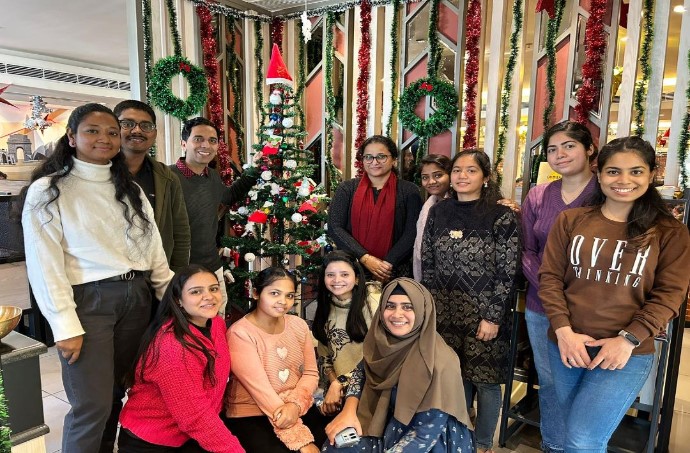
Dr.
Archna Singh
Female
Affiliation
Professor
Department of
Biochemistry
Contact
Email :
arch2574@gmail.com
arch_singh@ymail.com
Phone :
011-26593635
26593478
Academic Details:
| Degree | University | Subject | Year |
|---|---|---|---|
| MBBS | Nalanda Medical College, Patna, India | Medicine, Surgery, Gynecology | 1998 |
| M.D. | All India Institute of Medical Sciences, Delhi, India | Biochemistry | 2004 |
| Ph. D | All India Institute of Medical Sciences, Delhi, India | Biochemistry | 2008 |
| MPH | University of Michigan, Ann Arbor, US | Environmental Health (Nutrition concentration) | 2008 |
Positions held:
| Sr. No. | Position held | Name of Institution/Place | From | To |
|---|---|---|---|---|
| 1 | Professor | All India Institute of Medical Sciences, New Delhi, India. | July 2023 | Present |
| 2 | Additional Professor | All India Institute of Medical Sciences, New Delhi, India. | July 2019 | June 2023 |
| 3 | Associate Professor | All India Institute of Medical Sciences, New Delhi, India. | July 2016 | June 2019 |
| 4 | Assistant Professor. | All India Institute of Medical Sciences, New Delhi, India | Nov 2012 | June 2015 |
| 5 | Assistant Professor | IIPH-D, Public Health Foundation of India, New Delhi, India. | Jan 2009 | Oct 2012 |
| 6 | Senior Resident | All India Institute of Medical Sciences, New Delhi, India | August 2004 | July 2007 |
| 7 | Junior Resident | All India Institute of Medical Sciences, New Delhi, India. | July 2001 | June 2004 |
Society Memberships:
1. Life Member of the Society for Mitochondrial Research and Medicine, India.
2. Life Member, Indian Association for Cancer Research.
3. Life Member of Immunology Society of India.
4. Life member of Association of Medical Biochemists of India
List of Lab members
- Dr.Bhanupriya Awasthi, Postdoctoral Fellow.
- Ms. Sakshi Shukla, Doctoral student.
- Dr.Anudeep P P, Senior demonstrator (Not in pic).
- Dr.Laxmi Pillai, Junior Resident, (Not in pic).
- Ms. Bindiya Jindal, M.Sc. student.
- Ms.Shikha Roy, M.Sc. student.
- Adeeba Malik, Junior Research Fellow.
- Dr. Abishek G, MD student (not in pic).
- Ms. Dolly Rathore, Laboratory Technician.
- Mr.Mudassir Ali, Laboratory Technician.
- Mr.Ram Vikas Yadav, Laboratory Technician.
- Mr.Nidhi Bailwal, Laboratory Technician.
- Megha Suresh, Nutrition Research Associate.
- Sabiha Khan, Senior Nutrition Research Fellow.
Positions Available: Expected in January 2024.
Research Focus of the Lab :
The broad research focus of my laboratory is on different aspects of lipid metabolism in cancer and obesity. Some of our research revolves around the role of ABCA1, involved in lipid efflux, in maintaining adipocyte homeostasis in obesity since we observed a lower gene expression of this transporter in the visceral adipose tissue of obese individuals. We are looking at pathways related to adipocyte ABCA1 and some lipid species like ceramides that could drive insulin resistance in obesity. We have also studied HDL’s function and quality concerning its key physiological roles i.e., in reverse cholesterol transport, antioxidative capacity, endothelial reactivity etc. We aim to understand the implications of changes in the quality of various HDL-associated molecules such as ApoA1 and Sphingosine-1-phosphate. Our cancer research focuses on analysing various aspects of metabolic reprogramming in pediatric B-ALL. We have recently found inter-tumor heterogeneity in the expression of lipid metabolism enzymes like ACSM3, and ACSL1 among pediatric B-ALL cases and we are planning to apply various approaches to understand the biological implications of this differential expression. Other avenues of interest include bioenergetics, mitochondrial biogenesis and factors regulating mitochondrial DNA copy number in leukemia.
The nutrition research in the lab extends into both the biochemical and public health domains in the context of the dietary quality and nutritional status of indigenous tribal communities of India. Our work among these communities encompasses food systems sustainability research and I am a collaborator on a recently awarded Team Science Grant on this theme in which my role is to develop successful diagnostic technologies for micronutrient assessment that can be feasible and cost-effective for assessing micronutrient status in these vulnerable communities. My interest extends to exploring the nutrient profiles of unique indigenous varieties of foods like mushrooms and indigenous rice varieties. We have also recently started work on a collaborative project with the Department of Cardiology and TGI, India for understanding the effect of foods on inflammatory biomarkers among CAD patients.
We are ably supported in our research work by experienced and sincere laboratory technicians. We are an enthusiastic research group, promoting collaborative work with various departments at AIIMS and between Institutes like IGIB and TGI, India. We endeavour to publish and disseminate our work across the global research community.
In keeping with our interest in metabolism, we enjoy experimenting with various cuisines and enjoy varied culinary experiences to rejuvenate ourselves occasionally.
We have a vibrant and enthusiastic team in the lab that is always striving to enhance their academic and extra-curricular skills.
Some Key publications:
- Thakkar H, Vincent V, Roy A and Singh A. Thakkar H, Vincent V, Roy A, Singh A. High density lipoprotein heterogeneity & function among Indians with coronary artery disease. Indian J Med Res. 2023;158(3):292-302. doi:10.4103/ijmr.ijmr_1212_22.
- Sharma G, Tran TM, Bansal I, et al. RNA binding protein IGF2BP1 synergizes with ETV6-RUNX1 to drive oncogenic signaling in B-cell Acute Lymphoblastic Leukemia. J Exp Clin Cancer Res. 2023;42(1):231. Published 2023 Sep 5. doi:10.1186/s13046-023-02810-1.
- Sachan, A, Aggarwal, S, Pol, MM, Singh, A, Yadav, R. Expression analysis of MMP14: Key enzyme action in modulating visceral adipose tissue plasticity in patients with obesity. Clinical Obesity, 2023 e12607. doi:10.1111/cob.12607.
- Bansal A, Singh A, Nag TC, Sharma D, Garg B, Bhatla N, Choudhury SD, Ramakrishnan L. Augmenting the Angiogenic Profile and Functionality of Cord Blood Endothelial Colony-Forming Cells by Indirect Priming with Bone-Marrow-Derived Mesenchymal Stromal Cells. Biomedicines. 2023 May 5;11(5):1372. doi: 10.3390/biomedicines11051372. PMID: 37239042; PMCID: PMC10216643.
- Singh A, Dhasmana A, Bandhu A, Kapoor R, Baalasubramanian S, Ghosh-Jerath S. Contribution of natural food environments to nutritional intake and biomarker status: insights from the women of indigenous santhal communities of Jharkhand, India. BMC Nutr. 2023 Jan 27;9(1):20. doi: 10.1186/s40795-023-00669-1. PMID: 36707902; PMCID: PMC9881317.
- Singh A, Baalasubramanian S, Kalaivani M, Kapoor R, Bhagwat K, Ghosh-Jerath S. Standardisation and application of a novel multiplex assay for estimating micronutrient status and inflammatory markers in women of Sauria Paharia and Santhal tribes of Jharkhand. Br J Nutr. 2022:1-16. doi: 10.1017/S0007114522000320.
- Sen A, Singh A, Roy A, Mohanty S, Naik N, Kalaivani M, Ramakrishnan L. Role of endothelial colony forming cells (ECFCs) Tetrahydrobiopterin (BH4) in determining ECFCs functionality in coronary artery disease (CAD) patients. Sci Rep. 2022;12(1):3076. doi: 10.1038/s41598-022-06758-8. PMID: 35197509.
- Singh R, Jain A, Palanichamy JK, Nag TC, Bakhshi S, Singh A. Ultrastructural changes in cristae of lymphoblasts in acute lymphoblastic leukemia parallel alterations in biogenesis markers. Appl Microsc. 2021 Dec 29;51(1):20. doi: 10.1186/s42649-021-00069-4. PMID: 34964922.
- Sachan A, Singh A, Shukla S, Aggarwal S, Mir I, Yadav R. An immediate post op and follow up assessment of circulating adipo-cytokines after bariatric surgery in morbid obesity. Metabol Open. 2021 Nov 1;13:100147. doi: 10.1016/j.metop.2021.100147. PMID: 34993466; PMCID: PMC8713110.
- Thakkar H, Vincent V, Roy A, Gautam AK, Kutum R, Ramakrishnan L, Singh S, Singh A. Determinants of high-density lipoprotein (HDL) functions beyond proteome in Asian Indians: exploring the fatty acid profile of HDL phospholipids. Mol Cell Biochem. 2021. doi: 10.1007/s11010-021-04304-0. Epub ahead of print. PMID: 34843015.
- Thakkar H, Vincent V, Shukla S, Sra M, Kanga U, Aggarwal S, Singh A. Improvements in cholesterol efflux capacity of HDL and adiponectin contribute to mitigation in cardiovascular disease risk after bariatric surgery in a cohort with morbid obesity. Diabetol Metab Syndr. 2021 Apr 17;13(1):46. doi: 10.1186/s13098-021-00662-3. PMID: 33865458; PMCID: PMC8053301.
- Thakkar H, Vincent V, Sen A, Singh A, Roy A. Changing Perspectives on HDL: From Simple Quantity Measurements to Functional Quality Assessment. J Lipids. 2021 Apr 26;2021:5585521. doi: 10.1155/2021/5585521. PMID: 33996157; PMCID: PMC8096543.
- Ghosh-Jerath S, Kapoor R, Singh A, Downs S, Barman S, Fanzo J. Leveraging Traditional Ecological Knowledge and Access to Nutrient-Rich Indigenous Foods to Help Achieve SDG 2: An Analysis of the Indigenous Foods of Sauria Paharias, a Vulnerable Tribal Community in Jharkhand, India. Front Nutr. 2020 Jun 2;7:61. doi: 10.3389/fnut.2020.00061. PMID: 32582750; PMCID: PMC7280452.
- Thakkar H, Vincent V, Roy A, Singh S, Ramakrishnan L, Kalaivani M, Singh A. HDL functions and their interaction in patients with ST elevation myocardial infarction: a case control study. Lipids Health Dis. 2020 Apr 15;19(1):75. doi: 10.1186/s12944-020-01260-4. PMID: 32293456; PMCID: PMC7158160.
- Vincent V, Thakkar H, Verma A, Sen A, Chandran N, Singh A. A novel flow cytometry-based quantitative monocyte adhesion assay to estimate endothelial cell activation in vitro. Biotechniques. 2020;68(6):325-333. doi:10.2144/btn-2019-0169. PMID: 32283953.
- Ghosh-Jerath S, Downs S, Singh A, Paramanik S, Goldberg G, Fanzo J. Innovative matrix for applying a food systems approach for developing interventions to address nutrient deficiencies in indigenous communities in India: a study protocol. BMC Public Health. 2019;19(1):944. doi:10.1186/s12889-019-6963-2. PubMed PMID: 31307415.
- Tyagi A, Pramanik R, Bakhshi R, Singh A, Vishnubhatla S, Bakhshi S. Expression of mitochondrial genes predicts survival in pediatric acute myeloid leukemia. Int J Hematol. 2019 Aug;110(2):205-212. doi: 10.1007/s12185-019-02666-2.
- Vinnyfred Vincent, Himani Thakkar, Sandeep Aggarwal, Asit Mridha, Lakshmy Ramakrishnan, Archna Singh. ATP binding cassette transporter A1 (ABCA1) expression in adipose tissue and its modulation with insulin resistance in obesity. Diabetes Metab Syndr Obes. 2019; 12:275-284. doi: 10.2147/DMSO.S186565.
- Suparna Ghosh-Jerath, Archna Singh, Tanica Lyngdoh, Melina S Magsumbol, Preeti Kamboj, Gail Goldberg. Estimates of indigenous food consumption and their contribution to nutrient intake in Oraon tribal women of Jharkhand, India. Food and Nutrition Bulletin. 2018 Dec;39(4):581-594. doi: 10.1177/0379572118805652.
- Tyagi A, Pramanik R, Vishnubhatla S, Ali S, Bakhshi R, Chopra A, Singh A, Bakhshi S. Pattern of mitochondrial D-loop variations and their relation with mitochondrial encoded genes in pediatric acute myeloid leukemia. Mutat Res. 2018 Jul;810:13-18. doi: 10.1016/j.mrfmmm.2018.05.002.
- Jain A, Bakhshi S, Thakkar H, Gerards M, Singh A. Elevated mitochondrial DNA copy numbers in pediatric acute lymphoblastic leukemia: A potential biomarker for predicting inferior survival. Pediatr Blood Cancer. 2018;65(3). doi: 10.1002/pbc.26874.
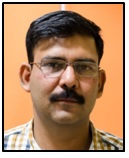
Dr.
Sudip Sen
Male
Affiliation
Professor
Department of
Biochemistry
Contact
Email :
sudipsen665@gmail.com
Phone :
+91-11-2659-4945
Academic Details :
| Degree | Subject | University/ Institution | Year |
|---|---|---|---|
| Ph.D. | Biochemistry | AIIMS, New Delhi | 2007 |
| M.D. | Biochemistry | AIIMS, New Delhi | 2002 |
| M.B.B.S. | N.A. | N.R.S. Medical College, Calcutta | 1995 |
Positions held
| Position | Department | University/ Institution | Dates |
|---|---|---|---|
| Professor | Biochemistry | AIIMS, New Delhi | 2022 – till date |
| Additional Professor | Biochemistry | AIIMS, New Delhi | 2018 – 2022 |
| Associate Professor | Biochemistry | AIIMS, New Delhi | 2015 – 2018 |
| Assistant Professor | Biochemistry | AIIMS, New Delhi | 2012 – 2015 |
| Assistant Professor | Biochemistry | UCMS, Delhi | 2009 – 2012 |
| DST Fast Track Fellow | Biochemistry & Ophthalmology | AIIMS, New Delhi | 2006 – 2009 |
Notable Awards and Society Memberships:
- Member of National Academy of Medical Sciences (MNAMS) 2014.
- Member of
- (a) Society for Neurosciences (SfN)
- (b) Federation of European Neuroscience Societies (FENS)
- (c) International Society for Stem Cell Research (ISSCR)
- (d) Indian Academy of Neurosciences (IAN)
- (e) Indian Association for Cancer Research (IACR)
- (f) AMBI and ACBI
- (g) Delhi Medical Association
List of Lab members:
Currently enrolled Ph.D. scholars:
- Mr. Sagar Tyagi, MSc
- Dr. Vadanya Shrivastava, MD
M.D. student:
- Dr. Rajkumar Mandal
- Dr. Sona Fazil
Staff:
- Mrs. Amrita Sachdeva (Admn.)
- Mr. Pramod Kumar (Lab attendant)
- Mr. Avdesh Kumar (Project staff)
Lab alumni:
- Dr. Janvie Manhas, MD, PhD
- Dr. Devanjan Dey, PhD
- Dr. Aditi Bhattacharya, PhD
- Dr. Amarpreet Kaur, MD, PhD
- Dr. Sandeep K. Agrawal, MD
- Dr. Janvie Manhas, MD
- Dr. Pradeep Jingar, MD
- Dr. Vadanya Shrivastava, MD
- Dr. Pawan Pagaku
- Ms. Nupur Khera, MSc
- Ms. Sumedha Saluja, MSc
- Ms. Diksha Joshi, MSc
- Ms. Sweety Rani Goyal, MSc
Positions Available: Contact by email to get the latest information.
Research Focus of the Lab
We have developed an in-vitro model of cerebral palsy using fetal neural stem cells (FNSCs), in collaboration with NBRC, Manesar. This model is helping us identify the changes that occur during the disease process, and determine better ways by which we can prevent/treat cerebral palsy.
Recent publications:
- Dey D, Shrivastava V, Joshi D, Singal CMS, Tyagi S, Bhat MA, Jaiswal P, Sharma JB, Palanichamy JK, Sinha S, Seth P, Sen S. Hypoxia induces early neurogenesis in human fetal neural stem cells by activating the WNT pathway. Molecular Neurobiology, Feb 2023 (doi: 10.1007/s12035-023-03248-4).
- Pruthi G, Rawat P, Sen S, Jain V. Effect of soft liner on masticator efficiency and bite force in first time complete denture wearers: a crossover clinical study. Accepted in International Journal of Prosthodontics and Restorative Dentistry, Feb, 2023.
- Manhas J, Lohani LR, Seethy A, Kumar U, Gamanagatti S, Sen S. Case report: Characterization of a rare pathogenic variant associated with loss of COL3A1 expression in vascular Ehlers Danlos syndrome. Frontiers in Cardiovascular Medicine, October, 2022. doi: 10.3389/fcvm.2022.939013.
- Sarangi J, Ahmad A, Sulaiman M, Ghosh S, Gupta B, Panwar R, Pal S, Yadav R, Ahuja V, Sen S, Upadhyay AD, Dash NR, Gupta SD, Das P. Methylation study of tumor suppressor genes in Human Aberrant Crypt Foci, Colorectal Carcinomas, and Normal Colon. Accepted in Journal of Cancer Research and Therapeutics, September, 2022.
- Aryal A, Pagaku PK, Dey D, Tyagi S, Shrivastava V, Bhattacharya A, Rani S, Nayak D, Khurana A, Khanna P, Goyal A, Mridha AR, Garg B, Sen S. Protocol for developing a femur osteotomy model in Wistar albino rats. Journal of Visualized Experiments, Aug 2022; e63712. doi.org/10.3791/63712.
- Shrivastava V, Dey D, Singal CMS, Jaiswal P, Singh A, Sharma JB, Chattopadhyay P, Nayak NR, Palanichamy JK, Sinha S, Seth P, Sen S. Glutamate uptake is not impaired by hypoxia in a culture model of human fetal neural stem cell-derived astrocytes. Genes, 2022; 13(3): 506. doi.org/10.3390/genes13030506
- Bhattacharya A, Saluja S, Managuli V, Agrawal S, Dey D, Garg B, Ansari MT, Roy S, Sen S. Comparing migratory and mechanical properties of human bone marrow-derived mesenchymal stem cells with colon cancer cells in vitro. J Gastrointest Cancer, 2021 Sep;52(3):882-891. doi: 10.1007/s12029-020-00476-y.
- Dey D, Jingar P, Agrawal S, Shrivastava V, Bhattacharya A, Manhas J, Garg B, Ansari MT, Mridha AR, Sreenivas V, Khurana A, Sen S. Symphytum officinale augments osteogenesis in human bone marrow-derived mesenchymal stem cells in vitro as they differentiate into osteoblasts. J Ethnopharmacology, 2020 Feb 10;248:112329. doi: 10.1016/j.jep.2019.112329

Dr.
Kunzang Chosdol
Others
Affiliation
Professor
Department of
Biochemistry
Contact
Email :
kunzangchosdol@yahoo.com
kchosdol@gmail.com
Phone :
91-11-26549235
Address: Room no 4007,
4th Floor, Convergence Block,
Department of Biochemistry,
All India Institute of medical Sciences, New Delhi
Academic Details
| Degree | Subject | University/ Institution | Year |
|---|---|---|---|
| PhD | Biochemistry | AIIMS, New Delhi | 2007 |
| MD | Biochemistry | AIIMS, New Delhi | 1999 |
| MBBS & Internship | Medicine | Bundhelkhand University, Jhansi, UP | 1995 |
Positions held:
| Position | Department | University/ Institution | Dates |
|---|---|---|---|
| Professor | Biochemistry | All India Institute of Medical Science, New Delhi | 2014- Till date |
| Additional Professor | Biochemistry | All India Institute of Medical Science, New Delhi | 2010-2014 |
| Associate Professor | Biochemistry | All India Institute of Medical Science, New Delhi | 2007-2010 |
| Assistant Professor | Biochemistry | All India Institute of Medical Science, New Delhi | 2003-2007 |
| Senior Demonstrator | Biochemistry | All India Institute of Medical Science, New Delhi | 2000-2003 |
Notable Awards and Society Memberships
- AIIMS Excellence Research Award- 2015 (3rd Prize) in recognition of the outstanding publication “A combined gene signature of hypoxia and Notch pathway in human glioblastoma and its prognostic relevance”
- ISNO Presidents Award -2014 for the best Clinician Researcher in Basic Neuro-Oncology, awarded during 6th Annual Conference of the Indian Society of neuro-Oncology (11-13 April, 2014) at Lucknow.
- AIIMS Excellence Research Award-2013(Third prize) in recognition of the outstanding publication “FAT1 acts as an upstream regulator of oncogenic and inflammatory pathways, via PDCD4, in glioma cells”.
- DSTFAST TRACK Scheme for Young Scientist: 2010 and 2003.
- International Travel Grant from AIIMS to present my work in conference -IXth European Congress of Neuropathology, Greece. May, 2008
- INSA (Indian National Science Academy) Travel Support to attend the conference -IXth European Congress of Neuropathology, Greece. May, 2008
- Travel Fellowship by the MNBWS organizers (USA) to present my work during symposium - MNBWS; 50 years on: From the Double helix to Molecular Medicine, Miami, Florida. 2003.
- CSIR International Travel Grant to present my work in a symposium - MNBWS; 50 years on: From the Double helix to Molecular Medicine, Miami, Florida. 2003.
Patents:
1. Indian Patent Application No. 1400/DEL/2013: Sinha S, Khan I, Zakaria MK, Chosdol K, Chattopadhyay P for the invention entitled “Placental like Alkaline Phosphatase (PLAP) Promoter Mediated Cell Targeting”
2. Indian patent, PCT-1282 (PCT/IB2013/05008): Chosdol K, Dikshit B and Sinha S: For the “Use of FAT1 gene and its products including RNA, protein and the derivatives of the same, as suitable molecules for either inflammation or cancer and the associated phenotype and the processes linking the same and also as a biomarker for the above processes”. International patent filed, PCT in process.
Society Memberships:
- National Academy of Medical Sciences (NAMS)
- Indian Association for Cancer Research (IACR)
- Vice-President (2016-2018)
- ― Treasurer (2014-2016)
- Indian Society for NeuroOncology (ISNO)
- Association of Clinical Biochemists of India (ACBI)
- Society for NeuroChemistry India (SNCI)
1.Dr. Khushboo Irshad, PhD - DST-SERB Young Scientist
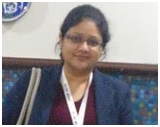
Dr. Khushboo Irshad completed her PhD at the Department of Biochemistry, AIIMS, New Delhi, in 2013 under the supervision of Prof. Kunzang Chosdol, Prof. Subrata Sinha and Prof. P. Chattopadhyay. Her thesis involved the study of correlation between hypoxia and Notch signaling pathway in glioblastoma and identification of a combined gene signature to predict the survival of glioblastoma patients. Her work derived a key prognostic molecular cluster characteristic of the Notch pathway response in hypoxic glioblastoma tumors and gliomasphere cultures (PLoS One (2015); 10(3):e0118201; felicitated with AIIMS Excellence Research Award-2015 that was awarded to Prof. Chosdol). Presently, her research focuses on deciphering the role of FAT1, a novel gene implicated in glioma, in regulating the hallmark features of glioma like stemness and invasiveness, as well as in maintenance of the balance between pro-inflammatory and anti-inflammatory signaling in glioma. She was awarded the DST-SERB Start-Up Research Grant in March 2016, for the project aimed at elucidation of FAT1 function in modulating pro-inflammatory signaling and anti-inflammatory / immunosuppressive signaling pathways in glioma.
2.Dr. SRINIVAS H, MD,DNB (PhD)
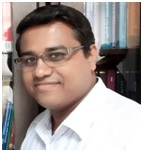
Dr. Srinivas H done MBBS from Bangalore Medical college, Rajiv gandhi university of health sciences Karnataka and MD from MAULANA AZAD Medical College, Delhi university, New Delhi. His MD thesis was on procalcitonin, IL 6, TNFalpha and urinary isoprostane in sepsis patients under the guidance of ex HOD and director professor Dr TK Mishra. He has completed one year of senior residency in PGIMER, Chandigarh and two year of senior residency in AIIMS, New Delhi. He has published his work in national and international papers in the various field of sciences and medical education. He is working now on pathway analysis of interaction between FAT1 with p53, HIF 1alpha and beta catenin in glioma as a PhD research scholar under the guidance of Dr KUNZANG CHOSDOL and Dr SUBRATA SINHA. He has done DNB from Diplomate of National Board in biochemistry and certification course in industry program, clinical trials and administration from bioinformatics institute of India. He is a Life member of Association of Medical Biochemistry of India since 2008
Life member of Society for Tissue Engineering and Regenerative Medicine (India), Thiruvananthapuram since 2010 and Indian Association of Cancer Research.
3.Ms. Chitrangda Srivastava - PhD scholar
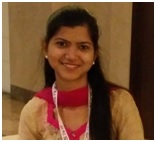
Ms. Chitrangda Srivastava is currently in her final year of PhD. She is working on the characterization of FAT1 gene promoter. In addition, she is analyzing the functional role of FAT1 with EMT and stemness in hypoxic glioma. She completed her M.Sc. from the department of Biochemistry, AIIMS, in 2012. Her M.Sc. thesis involved the study of the role of Notch signalling pathway with EMT and stemness in pathogenesis of glioma under hypoxia. She has won several awards during her PhD tenure, including Best Oral Presentation Award in ACOS-2016, European Young Scientist Travel Award-2015, G.P. Talwar Foundation Travel Award-2015, etc. She is an Associate Member of the American Association of Cancer Research since 2011 and an Associate Member of the European Society of Neuro-Oncology since 2016.
4.Nargis Malik, PhD. Scholar
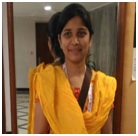
Nargis Malik completed her M.Sc. in toxicology from Meerut University, Currently she is a second year PhD. student working on the “Role of FAT1 gene on the regulation of microRNAs in glioma”
5.Ms. AKANKSHA KANOJIA, M.Sc. student
Akanksha Kanojia has completed her B.Sc.(H) in Biomedical Sciences from Acharya Narendra Dev College, University of Delhi in 2016. She is currently pursuing M.Sc. in Biochemistry from All India Institute of Medical Science, Delhi under the guidance of Dr. Kunzang Chosdol.
Mukesh Kumar (Laboratory Attendant Gr. II)
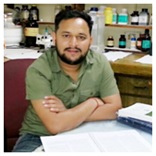
Mukesh Kumar is working as a Laboratory Attendant Gr.-II in the Department of Biochemistry since August 2011. He help in the research related work for M.Sc., Ph.D. and M.D. Students in Research Laboratory of Dr. Parthaprasad Chattopadhyay & Dr. Kunzang Chosdol. His nature of duties includes, culture work, DEPC treatment and assistance of UG/PG examination.
Research Focus of the Lab :
- Study of the role of the FAT1 gene in human glial tumorigenesis: We had identified the FAT1 gene (A Human Homologue of Drosophila Tumor Suppressor Gene fat) and its involvement in human glial tumors. Using RAPD-PCR technique, we have identified a consistently altered locus of chromosome 4q34-q35 which was found to be altered in ~ 50% of the tumors studied. We observed high LOH at the same locus. Our study is the first report of the involvement of FAT1 gene in glioma (BMC Cancer, 2009;9:5). On functional study in cell lines, we found FAT1 to have an oncogenic role in glioma. On knocking down of FAT1 expression by siRNA system in glioma cell lines, we found decreased cell migration and invasion, and decreased expression of various inflammatory modulators like COX2, IL1β, IL6 etc. FAT1 is found to be acting as an apical regulator acting via JNK/AP1 pathway for mediating both cancer cell migration & invasion as well as regulating the expression of various inflammatory modulators in glioma cells. Ours is the first report showing a novel role of FAT1 in regulating both cancer and inflammation in glioma (Oncogene, 2013;32:3798-808). A positive correlation between FAT1, HIF1α, EMT and stemness markers expression has been observed in GBM tumor samples as well as in glioma cell lines maintained under severe hypoxia. A novel role of FAT1 in positively regulating HIF1α via EGFR/AKT/mTOR signalling pathway in hypoxic glioma cell lines has been detected (IJC, 2016, Aug).
- Study of the role of Notch signaling under hypoxia in Glioblastoma: We analyzed the molecular link between the hypoxia markers and the Notch signaling molecules in primary GBM by real time PCR and analyzed their correlation. A molecular signature of hypoxia and Notch genes has been identified indicating the prognostic status of GBM patients (PLoS ONE, 2015;10(3):e0118201).
- Heterozygosity status of 1p and 19q and its correlation with p53 protein expression and EGFR amplification in patients with astrocytic tumors (Cancer Genet Cytogenet. 2010, 198,126-34). Have conducted research on the role of recombinogenic sequences on the genomic fluidity in gliomas (Mutation Research, 2001, 484: 53-59) and mutator hypothesis (BMC Cancer, 2007,7:190). We have also shown the role of alu mediated recombination in generating genomic instability under sublethal cytotoxic pressure, a possible mechanism of drug resistance (Int J Cancer, 2005;117:683. Cover Page Article).
- Another aspect of our work is to look at genetic polymorphism in ethnic groups and also their linkage with disease states. The status of p53 codon 72 for Arginine/proline allele polymorphisms in different ethnic groups (Ladakhi, Kashmiri, Punjabi, Rajasthani Gujjar and Rajasthani Rajput) in North India was studied by PCR-RFLP technique. We found significantly increased frequency of Argnine allele in the Ladakhi population only. The results indicates that HPV induced cervical carcinoma has no effect on the inheritance of this supposed “susceptibility” allele (Curr. Sci. 2002, 82;1253. Cover page article). We are studying the polymorphisms in folate metabolizing enzymes and their correlation with the levels of homocysteine, folate and Vitamin B12 in normal as well as glioma patients.
- We have collaborated in the following studies:
- The role of β-catenin/WNT signalling in the pathogenesis of eyelid sebaceous cell carcinoma (SbCC). Epigenetic inactivation could contribute to the reduced disease-free survival in eyelid sebaceous gland carcinoma (Br J Ophthalmol, 2011;95:284, Br J Dermatol, 2012;167:583,Br J Dermatol, 2015;173:811).
- The ionotropic glutamate receptor kainate3 (GRIK3) Ser310Ala (T928G) polymorphism and schizophrenia in the Indian population. We, for the first time, showed the prevalence of this polymorphism and its association with schizophrenia in the Indian population (World J Biol Psychiatry. 2009, 10:330-3).
- The promoter methylation status of MGMT (O6-methylguanine–DNA methyltransferase) gene and benefit from Temozolomide in Glioblastoma patients (Neurosurgery 2010;67:1681-91), analyzed microsatellite markers on chromosome 1p and 19q in gliomas especially Oligodendrogliomas (Cancer Genet Cytogenet. 2010, 198:126-34, DiagnMolPathol, 2011;20:40-7).
Recent publications:
- Madan E, Dikshit B, Gowda SH, Srivastava C, Sarkar C, Chattopadhyay P, Sinha S, Chosdol K (2016) FAT1 is a novel upstream regulator of HIF1α and invasion of high grade glioma. Int J Cancer. 2016 Aug 18. doi: 10.1002/ijc.30386. [Epub ahead of print]
- Jalota A, Kumar M, Das BC, Yadav AK, Chosdol K, Sinha S (2016) Synergistic increase in efficacy of a combination of 2-deoxy-D-glucose and cisplatin in normoxia and hypoxia: switch from autophagy to apoptosis. Tumour Biol. 2016 Jun 15. [Epub ahead of print]
- Bhardwaj M, Sen S, Sharma A, Kashyap S, Chosdol K, Pushker N, Bajaj MS, Bakhshi S (2015) ZEB2/SIP1 as novel prognostic indicator in eyelid sebaceous gland carcinoma. Hum Pathol. 2015 Oct;46(10):1437-42
- Irshad K, Mohapatra SK, Srivastava C, Garg H, Mishra S, Dikshit B, Sarkar C, Gupta D, Chandra PS, Chattopadhyay P, Sinha S, Chosdol K (2015) A Combined Gene Signature of Hypoxia and Notch Pathway in Human Glioblastoma and Its Prognostic Relevance. PLoS One. 2015 Mar 3;10(3):e0118201
- Jayaraj P, Sen S, Sharma A, Chosdol K, Kashyap S, Rai A, Pushker N, Bajaj M. (2015) Eyelid sebaceous carcinoma: a novel mutation in lymphoid enhancer-binding factor 1 (LEF1). Br J Dermatol. 2015 Sep;173(3): 811-4
- Chingkheilemba M, Kumar U, Chosdol K, Das N (2014). Lack of role of endothelial nitric oxide synthase gene Glu298Asp polymorphism in rheumatoid arthritis among Asian Indians. IOSR Journal of Dental and Medical Sciences (IOSR-JDMS) 2014; 13(4): 25-28.
- Dikshit B, Irshad K, Madan E, Aggarwal N, Sarkar C, Chandra PS, Gupta DK, Chattopadhyay P, Sinha S, Chosdol K (2013). FAT1 acts as an upstream regulator of oncogenic and inflammatory pathways, via PDCD4, in glioma cells. Oncogene. 2013 Aug 15;32(33):3798-808.
- Agarwal S, Sharma MC, Jha P, Pathak P, Suri V, Sarkar C, Chosdol K, Suri A, Kale SS, Mahapatra AK, Jha P (2013). Comparative study of IDH1 mutations in gliomas by immunohistochemistry and DNA sequencing. Neuro Oncol. 2013 Jun;15(6):718-26.
- Chosdol K, Misra A, Puri S, Srivastava T, Sarkar C, Mahapatra AK and Sinha S (2009) Frequent LOH and altered expression of tumor supressor FAT identified by RAPD in astrocytic tumors. BMC Cancer 9:5
- Srivastava T, Chosdol K, Chattopadhyay P, Mahapatra AK, Sarkar C, Sinha S (2007) Frequent loss of heterozygosity encompassing the hMLH1 locus in low grade astrocytic tumors. J Neuro-oncol. Feb;81(3):249-55.
Research Funding Agencies: DST; DRDO; DBT; IMRG (AIIMS).
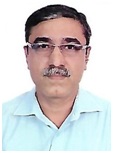
Dr.
Parthaprasad Chattopadhyay
Male
Affiliation
Professor
Department of
Biochemistry
Contact
Email :
parthoaiims@hotmail.com
Phone :
011-26549238
Address : Room No. 4007, Convergence Block, AIIMS, New Delhi.
EDUCATION
MBBS, (1981-1987) R G Kar Medical College, Calcutta University, Kolkata
MD, Biochemistry, (1989-1991) All India Institute of Medical Sciences, New Delhi.
PhD, Biochemistry (1992-1996) All India Institute of Medical Sciences, New Delhi.
PROFESSIONAL EXPERIENCE
Senior Demonstrator (1992-1995) Department of Biochemistry, AIIMS, New Delhi
Assistant Professor (1997-2003) Department of Biochemistry, AIIMS, New Delhi
Associate Professor (2003-2007) Department of Biochemistry, AIIMS, New Delhi
Additional Professor (2007-2011) Department of Biochemistry, AIIMS, New Delhi
Professor (2011- till date) Department of Biochemistry, AIIMS, New Delhi
Present Team
- PhD Students
- Neha Singh: Ritika Singh:
- MD student: Dr. Abhishek Mishra
Research Focus of the Lab
a) Nanoparticle trafficking within the cell: Tracing the path of nanoparticles within the cell and attempting to modulate their intracellular travel to prolong their stay within the cell for increased unloading of their cargo (drug).
b) Site-directed epigenetic modulation: Using modified CRISPR based techniques to modulate CpG methylation and Histone methylation/acetylation for altering gene expression of tumor suppressor and promoter genes
Strategic publications
- Passive internalization and active extrusion determines PLGA-nanoparticle concentration in cancer cell lines. Baidya G, Tiwary R, Mudassir M, Singh N, Saha S, Chosdol K, Sinha S, Chattopadhyay P..Nanomedicine (Lond). 2020 Aug;15(23):2229-2239.
- HIF-2α mediates a marked increase in migration and stemness characteristics in a subset of glioma cells under hypoxia by activating an Oct-4/Sox-2-Mena (INV) axis. Bhagat M, Palanichamy JK, Ramalingam P, Mudassir M, Irshad K, Chosdol K, Sarkar C, Seth P, Goswami S, Sinha S, Chattopadhyay P..Int J Biochem Cell Biol. 2016 May;74:60-71.
- A novel placental like alkaline phosphatase promoter driven transcriptional silencing combined with single chain variable fragment antibody based virosomal delivery for neoplastic cell targeting. Khan I, Zakaria MK, Kumar M, Mani P, Chattopadhyay P, Sarkar DP, Sinha S..J Transl Med. 2015 Aug 5;13:254.
- Gene Silencing and Activation of Human Papillomavirus 18 Is Modulated by Sense Promoter Associated RNA in Bidirectionally Transcribed Long Control Region. Kassab MA, Mudassir M, Singh A, Bhagat M, Palanichamy JK, Ramalingam P, Chosdol K, Sinha S, Chattopadhyay P..PLoS One. 2015 Jun 5;10(6):e0128416.
- Biogenesis of intronic miRNAs located in clusters by independent transcription and alternative splicing. Ramalingam P, Palanichamy JK, Singh A, Das P, Bhagat M, Kassab MA, Sinha S, Chattopadhyay P. RNA. 2014 Jan;20(1):76-87.
- Combination of hepatocyte specific delivery and transformation dependent expression of shRNA inducing transcriptional gene silencing of c-Myc promoter in hepatocellular carcinoma cells. Zakaria MK, Khan I, Mani P, Chattopadhyay P, Sarkar DP, Sinha S..BMC Cancer. 2014 Aug 10;14:582. doi: 10.1186/1471-2407-14-582.
- Long-term suppression of HIV-1C virus production in human peripheral blood mononuclear cells by LTR heterochromatization with a short double-stranded RNA. Singh A, Palanichamy JK, Ramalingam P, Kassab MA, Bhagat M, Andrabi R, Luthra K, Sinha S, Chattopadhyay P..J Antimicrob Chemother. 2014 Feb;69(2):404-15.
- CpG hypermethylation of the C-myc promoter by dsRNA results in growth suppression. Mehndiratta M, Palanichamy JK, Pal A, Bhagat M, Singh A, Sinha S, Chattopadhyay P..Mol Pharm. 2011 Dec 5;8(6):2302-9.
- Silencing of integrated human papillomavirus-16 oncogenes by small interfering RNA-mediated heterochromatization.Palanichamy JK, Mehndiratta M, Bhagat M, Ramalingam P, Das B, Das P, Sinha S, Chattopadhyay P..Mol Cancer Ther. 2010 Jul;9(7):2114-22.
- Aberrant methylation and associated transcriptional mobilization of Alu elements contributes to genomic instability in hypoxia. Pal A, Srivastava T, Sharma MK, Mehndiratta M, Das P, Sinha S, Chattopadhyay P..J Cell Mol Med. 2010 Nov;14(11):2646-54..
Funding Agencies
Department of Biotechnology and Department of Science & Technology, Ministry of Science & Technology, GOI.

Dr.
Veena Koul
Female
PhD
Affiliation
Professor
Department of
Biomedical Engineering
Contact
Email :
veenak@cbme.iitd.ac.in
veenak_iitd@yahoo.com
Phone :
+91-11-2659-1041 (O)/6132/ 6396 (PA)

Dr.
Biswarup Mukherjee
Male
PhD
Affiliation
Assistant Professor
Department of
Biomedical Engineering
Contact
Email :
bmukherjee@cbme.iitd.ac.in

Dr.
Jayanta Bhattacharyya
Male
PhD
Affiliation
Assistant Professor
Department of
Biomedical Engineering
Contact
Email :
jayanta@cbme.iitd.ac.in
Phone :
+91-11-2659-1337 (O)

Dr.
Deepak Joshi
Male
PhD
Affiliation
Assistant Professor
Department of
Biomedical Engineering
Contact
Email :
joshid@cbme.iitd.ac.in
Phone :
+91-11-2659-1155 (O)

Dr.
Amit Mehndiratta
Male
MBBS, DPhil (Oxon)
Affiliation
Assistant Professor
Department of
Biomedical Engineering
Contact
Email :
amehndiratta@cbme.iitd.ac.in
Phone :
+91-11-2659-6230






